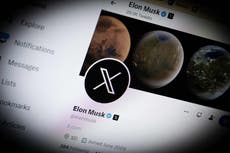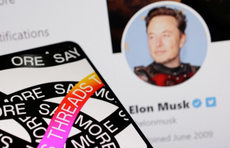Elon Musk responding to Bronny James is exactly what we can expect of Twitter now
On day two of the X rebrand

Your support helps us to tell the story
From reproductive rights to climate change to Big Tech, The Independent is on the ground when the story is developing. Whether it's investigating the financials of Elon Musk's pro-Trump PAC or producing our latest documentary, 'The A Word', which shines a light on the American women fighting for reproductive rights, we know how important it is to parse out the facts from the messaging.
At such a critical moment in US history, we need reporters on the ground. Your donation allows us to keep sending journalists to speak to both sides of the story.
The Independent is trusted by Americans across the entire political spectrum. And unlike many other quality news outlets, we choose not to lock Americans out of our reporting and analysis with paywalls. We believe quality journalism should be available to everyone, paid for by those who can afford it.
Your support makes all the difference.We were all just reminded why Elon Musk’s ownership of Twitter, now rebranded X, is so poisonous to our discourse.
Son of basketball legend LeBron James, 18-year-old Bronny James, suffered from cardiac arrest during a basketball workout. He was rushed to the hospital and, as of Tuesday afternoon, is in a stable condition. As we’ve come to see so commonly with sports stars and conditions like this, anti-vaccine conspiracy theories surged on social media, especially Twitter. The owner of the site couldn’t help but to join in.
Elon Musk wasted no time immediately suggesting the Covid-19 vaccine could be to blame. Musk tweeted (or xeeted?): “We cannot ascribe everything to the vaccine, but, by the same token, we cannot ascribe nothing. Myocarditis is a known side-effect. The only question is whether it is rare or common.”
Musk sent that post only 30 minutes after the first TMZ report on Bronny’s condition was released. He had zero information on what could have caused Bronny’s cardiac arrest, nor does he have any unique insight into Bronny’s potential pre-existing conditions. But Musk didn’t let his lack of evidence spread this anti-vaccine conspiracy theory. A simple “I wish Bronny a speedy recovery” would’ve sufficed.
When it comes to Musk’s unsolicited and unsubstantiated theory, the data doesn’t suggest it is the most likely explanation. Developing myocarditis from a Covid-19 vaccine is rare. In fact, the American Heart Association published a 2022 analysis of nearly 43 million people which found that people are more likely to develop myocarditis from Covid-19 itself than from the vaccine.
It’s also important to note that sudden cardiac arrests among young athletes are nothing new. In fact, in 2014, well before Covid-19 vaccines arrived, the NCAA convened a task force to evaluate cardiovascular care for their students. In 2016, the NCAA published a press release stating: “Sudden cardiac death is the most common nontraumatic cause of death among college athletes, and 75 percent of college student-athlete deaths occur during sports and exercise.”
Now, I’m not saying that Bronny’s chances of having myocarditis from the vaccine are zero. Like Musk, I do not have any deeper insight into the inner workings of this sad, developing case. But I do look at reliably sourced data, which suggests the chances are very low. If he was keen to speculate, I couldn’t help but wonder why, if the available data shows you are in fact more likely to develop myocarditis from Covid-19 itself, Musk didn’t speculate Covid-19 that could have been the cause? Or why didn’t he speculate it may have been another sudden cardiac arrest suffered by a young athlete? The answer seems to be that Musk was seeking to echo anti-vaccine rhetoric.
This intent would be unsurprising given Musk’s past proliferation of right-wing conspiracy theories, previous opposition to taking the Covid-19 vaccine, and his recent interview with anti-vax presidential candidate Robert F Kennedy Jr. Anti-vaccine conspiracy theories have become central to far-right messaging, and this particular brand of disinformation has found a home on Musk’s Twitter. Immediately after Musk’s purchase of Twitter last November, reports indicated a rise of anti-vaccine conspiracy theories from the newly purchased $8 blue check accounts. Countless studies have shown an increase in misinformation on Twitter since Musk’s October 2022 purchase.
Elon Musk has turned Twitter into a radicalization machine, and he shows no signs of changing course now. Rather than work to improve the platform’s problems, which have caused millions of people to flee to rival sites, Musk has instead focused on rebranding Twitter to “X.”
Musk claims he will make X an “everything” app, similar to China’s WeChat - fully equipped with messaging, payments, shopping, and banking. But rebranding before any of those features are complete and amid rising distrust of the platform seems like a major risk, especially as so many of Musk’s other product pushes have failed. Bloomberg estimates this rebrand could wipe out anywhere from $4 billion to $20 billion in value. Who knows where this will leave the company, whose valuation was already lowered from $44 billion to $15 billion.
Musk’s X rebrand was already risky enough by throwing away almost two decades of brand recognition any company would kill to have. “Tweet” is literally a verb in the dictionary. But it also looks like the move poses legal risks as well. It’s been discovered that Meta and Microsoft both own trademarks to X. In fact, Reuters reports that “nearly 900 active US trademark registrations that already cover the letter X in a wide range of industries.”
On day two of the X rebrand, it looks like we’re in for more of the same from Musk’s social media platform - unhinged conspiracy theories being encouraged by the owner himself with absolutely no regard for the consequences. What a compelling sales pitch.




Join our commenting forum
Join thought-provoking conversations, follow other Independent readers and see their replies
Comments